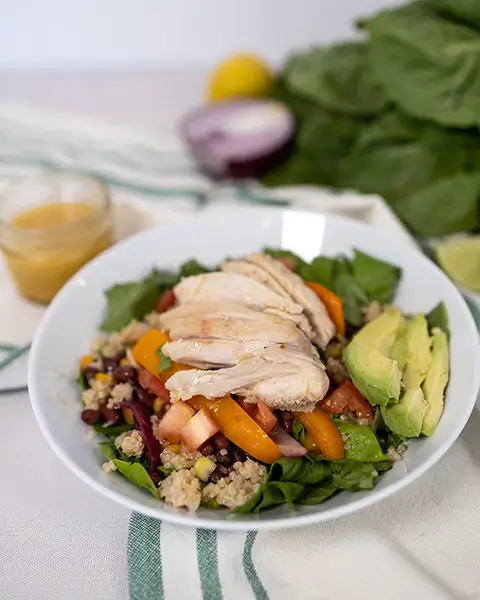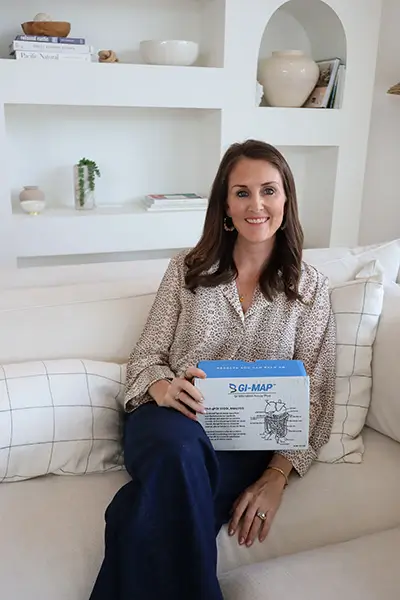Postpartum recovery isn’t just about getting more sleep or taking a multivitamin, it’s about restoring the deep nutrient reserves your body used to grow and birth a baby.
After going through two prior postpartum experiences and navigating a challenging third pregnancy, I knew I needed a better strategy this time around, which is why I’m sharing how Hair Tissue Mineral Analysis (HTMA) gave me the insights I needed to create a personalized plan for my own postpartum vitamin and mineral support.
Whether you’re newly postpartum, preparing for it, or just feeling stuck in exhaustion, this might be the missing piece for you.
What HTMA Is—and Why It’s a Game-Changer for Postpartum Recovery
HTMA stands for Hair Tissue Mineral Analysis. Unlike blood work, which offers a short-term snapshot, HTMA shows how your body has handled mineral demands over the past 2-3 months. It reflects what your body has been doing with nutrients, not just what’s in your bloodstream in that moment.
Why does this matter postpartum? Because pregnancy, birth, and breastfeeding pull heavily from your mineral reserves. Even if you’re taking a prenatal or eating “healthy,” you could still be running on empty. HTMA gives you the clarity to see exactly which minerals need rebuilding, and how to do it efficiently.
It’s one of the best tools we use with our clients and one I now rely on personally (so does my family!).
What My HTMA Revealed and How I’m Supporting My Body Postpartum
The first step to rebuilding your energy and supporting your body postpartum is getting the data. Without knowing where you’re starting from, it’s hard to create a plan that actually works. That’s why I ran an HTMA test late in pregnancy to take a proactive approach and make sure I wasn’t guessing about what I needed. Here’s what showed up in my results and how it’s shaping my recovery.
Before we dive into the deeper patterns, let’s start with the basics. HTMA tests four core minerals: calcium, magnesium, sodium, and potassium. These give a quick but powerful overview of how your body is managing energy, hydration, digestion, and stress.
I Was Low in Sodium, Potassium, and Magnesium
Despite using mineral mocktails and a high-quality prenatal, my HTMA showed I was low in three out of four core minerals:
- Sodium: Hydration, energy, blood pressure
- Potassium: Energy, digestion, bowel motility
- Magnesium: Relaxation, sleep, muscle recovery
Postpartum is already a time when fatigue and stress are high. Knowing these were low helped me understand why even basic tasks felt depleting and gave me a clear direction for support.
My Mineral Ratios Pointed to Deeper Imbalances
Once we understood the basics, the next step was to look at the relationships between minerals. HTMA really shines when you start connecting the dots through mineral ratios. My test showed:
- Calcium:Phosphorus (Metabolism Ratio) → Sluggish energy production
- Calcium:Magnesium (Blood Sugar Ratio) → More sensitive blood sugar responses
- Sodium:Magnesium (Adrenal Ratio) → Signs of burnout and adrenal stress
Even though I was “functioning,” my body was clearly under strain. These patterns confirmed why I sometimes felt wired but tired, and why sleep didn’t always feel restorative.
I Needed Extra Support for Copper, Iron, and Cobalt
- Copper: Essential for iron regulation and postpartum hormone balance
- Iron: My ferritin had dropped (common in pregnancy), but HTMA helped me look at it in context with copper and vitamin A
- Cobalt: A building block for B12, supporting energy and nervous system recovery
How I’m Supporting My Body with Postpartum Vitamin and Mineral Support
Once I understood the specific imbalances and patterns in my HTMA results, I was able to map out a clear recovery plan. Instead of guessing what supplements to take or relying on general advice, I could focus on exactly what my body needed to rebuild after pregnancy and prepare for postpartum demands like breastfeeding, sleep disruption, and hormone shifts. Here’s how I’m approaching my postpartum vitamin and mineral support now:
1. Custom HTMA-Based Mineral Powder
I swapped out my prenatal for a powder tailored to my HTMA results. This blend is designed specifically for what my body needs. No more guessing or buying five separate supplements. It’s more effective, more convenient, and way easier to stay consistent when life with a newborn is already full.
2. Daily High-Potassium and High-Sodium Mineral Mocktails
I drink 1–2 mineral-rich mocktails daily, focused on replenishing potassium and sodium: two key minerals that dropped during pregnancy. These drinks help support hydration, milk supply, and that mid-afternoon energy slump without needing a second cup of coffee. I rotate ingredients like cream of tartar, coconut water, citrus, and sea salt depending on what my body needs and what I can tolerate.These support hydration, energy, and milk supply. I’m sticking to 1–2 per day with ingredients tailored to what my body needs now. Want more mocktail ideas? Be sure to download this free mineral guide.
3. Magnesium at Night
Magnesium helps me wind down, supports regular bowel movements, and helps offset some of the tension from long nursing sessions and interrupted sleep. I regularly use Epsom salt baths and topical magnesium spray. These forms of transdermal magnesium allow my body to absorb what it needs through the skin, which can be especially helpful when digestion is sluggish or I’m feeling extra tense. The baths are calming and help reduce physical discomfort, while the spray is a convenient daily option to support muscle recovery, stress resilience, and deeper sleep. If you don’t have time for a bath, try an epsom salt foot soak while nursing your newborn!
4. Mineral-Rich Foods
Even though supplementation helps, food is still foundational. I’m focusing on:
- Bone broth and leafy greens
- Bananas and potatoes for potassium
- Liver and fermented dairy for copper, calcium, and vitamin A
- Force of Nature blends for sneaky liver inclusion
Minerals are essential to every system in the body, and unlike vitamins, we can’t make them internally. That means we must get them through food or topical support. A mineral-rich diet is the most sustainable way to rebuild your body after pregnancy and keep things balanced long-term.
5. NORA Tea
This mineral-rich herbal blend (nettle, oat straw, red raspberry leaf, alfalfa) supports labor prep, postpartum recovery, and milk production. It’s an easy way to get extra minerals in through hydration, especially on days when appetite is low or energy is limited. NORA tea pairs well with other gentle supports like Epsom salt baths and topical magnesium, which help replenish magnesium stores transdermally, ease muscle soreness, and promote deeper relaxation, especially valuable in the final weeks of pregnancy and early postpartum. I love buying loose leaf herbs from Mountain Rose Herbs and making my own blend.
The Foundation of Effective Postpartum Vitamin and Mineral Support
Here’s the truth: if you’re feeling tired, anxious, or just off postpartum, it may not be “just hormones” or “just motherhood.” It might be mineral depletion. Postpartum vitamin and mineral support can change everything from your energy and mood to your digestion and milk supply.
HTMA helped me connect the dots between my symptoms and my physiology. It gave me a concrete plan instead of guessing. And now, I’m supporting my recovery in a way that feels aligned, simple, and sustainable.
Ready to get your own data? Learn more & order your HTMA Bundle here and start your personalized postpartum mineral plan today.
Because motherhood is demanding and your recovery deserves just as much intention as your pregnancy.








